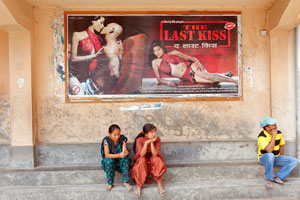 BIKRAM RAI |
Nepali filmmakers have uncovered a hit formula for creating trailers and designing posters: display as much kissing, sex and skin as possible in less than two minutes or on 81 by 81 inch sheets. Under this formula, story line, central characters and quality are irrelevant. The motto seems to be to sell sleaze and lure audiences to theatres at any cost.
Chapali Heights tried it and now the producers of The Last Kiss: A Unique Love Story have applied the same technique. But a film promising to be a 'love story' replete with steamy bedroom scenes is actually a psychological thriller with relatively few sexually explicit moments, barring the introductory song and the occasional use of the 'm' word (which have been bleeped out at the request of the censor board).
However, once viewers get over their disappointment at being misled by promotional materials, they find out the producers are using another marketing tactic: senseless and gory violence. Perhaps the increasing aggression and brutality we see in our movies today reflect the volatile state of Nepal.
When audiences are made to sit through two hours of continuous bloodshed, fighting and a never-ending chase sequence in a forest, then something is seriously wrong with the film. It doesn't help that The Last Kiss also has a very weak plot, poorly executed climax, clumsy (almost clownish) actors and plagarised background music. In the end all the characters are killed and the audience is left to wonder why they were put through the charade.
Makers of films like The Last Kiss underestimate Nepali moviegoers, both the ones who frequent Guna Cinema, Gopi Krishna and Pushpanjali as well as the multiplex crowd. Kollywood insiders don't realise that growing access to Hindi, English as well as Korean, Tamil, and European cinema has made movie buffs more sophisticated and they can distinguish between good films and films where script, acting, and editing are mere afterthoughts.
Lack of finances and technical knowhow is not the problem. Our filmmakers are already shooting in foreign locations, building elaborate sets and experimenting with computerised fight sequences. Lack of original story ideas cannot be blamed either. If writers looked in the right places, they would unearth a lot of stories that need to be told in a country that has undergone a decade long war and finds itself in transition. It's the 'anything works' attitude of industry people and disregard of the public that have stalled Kollywood's progress.
Sex, violence and melodrama might sell tickets, but intelligent and honestly made films wouldn't hurt the box office either.
Read also:


